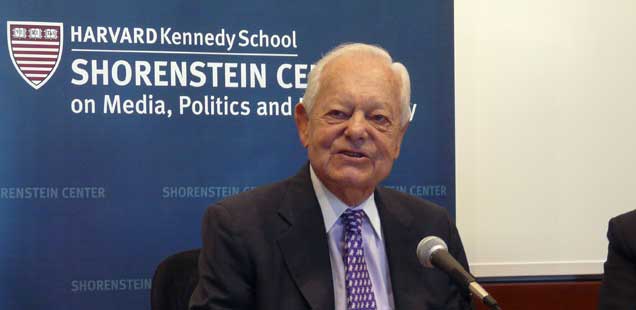Bob Schieffer: Media Coverage of the Campaign

April 20, 2016 — Bob Schieffer, Walter Shorenstein Media and Democracy Fellow, veteran CBS reporter, and former moderator of “Face the Nation,” discussed the media’s performance in covering the 2016 election and Donald Trump’s campaign, and looked ahead to the general election.
Trump “understands television,” said Schieffer. While most candidates hire campaign consultants who will control the narrative and discourage frequent media appearances, “Trump understood that if you get out there and get on enough of these shows, you’re going to get your name out there and your brand out there — because that’s what his business is, getting his brand out there.”
Trump also has an “innate ability” to refocus the media’s narrative and change the subject, similar to Lynton Crosby’s “dead cat strategy,” said Schieffer. “If you’re having a dinner party, no matter what the conversation is about, if somebody throws a dead cat on the table, the conversation will suddenly shift to talking about the dead cat.” Trump’s rise was “not a media creation,” Schieffer continued, rather, it was “a Trump creation.”
After such extensive exposure, the media is now starting to ask more follow-up questions of Trump, said Schieffer. “So many of these things that he has proposed get the same follow-up question – how are you going to do that?” The answers he has given to questions about proposals to “rethink” NATO involvement, to restrict trade with China, and to build a wall at the U.S.-Mexico border “really do not meet the test,” said Schieffer.
What’s happening here is we’re having a campaign cycle where, many times, attitude seems to count more to the supporters of a particular candidate than facts.
Hillary Clinton, by contrast, has been running an “old-fashioned” campaign in her approach to media relations, said Schieffer. “When people would say to us ‘how is it that you let Donald Trump call in to a show, why is that fair? Why do you never let Hillary Clinton do that?’ Well, my answer to that is: Have you ever tried to get Hillary Clinton on the phone? You’ve got to go through nine or 10 different people and they have schedulers and consultants…that campaign was just so slow to move and get organized. That, I think, in many ways, is why she has been given such a challenge by Bernie Sanders.”
The media is also doing more fact-checking in the 2016 election cycle than in the past, said Schieffer. “But what’s happening here is we’re having a campaign cycle where, many times, attitude seems to count more to the supporters of a particular candidate than facts.” He cited that 29 percent of Americans and 43 percent of Republicans believe Obama was born in Kenya. “How much fact checking do you have to do on that?”
“The most important thing that we can do is to let the American people see these [candidates] – who they are and what they stand for,” he said. “There are many criticisms I could make about the debates…but when you come right down to it, I think we all are getting a pretty good picture of who these people are.”
Turning toward the general election and beyond, Schieffer said that “Both parties, and the whole party system, I think, are in deep trouble.”
“If Trump is the nominee on one side, and Hillary Clinton is the nominee on the other, it may be the first time…that both parties have nominated someone that the majority of the American people don’t like,” he said.
How is it that the Democratic Party was only able to come up with “one legitimate candidate?” Schieffer asked. And although Clinton has support from minority groups, she continues to be less popular among young voters, he said. Meanwhile, the Republican Party appears to be on the verge of a split. “If we get to this convention and Trump does not have the 1,237 votes he needs to get the nomination before he gets there, I think you might see the whole thing just come apart before your eyes.”
Schieffer predicted that the situation could be akin to the 1968 Democratic National Convention. “Maybe we’ll have two parties, maybe we’ll have a party that just remains deeply divided and fractured, but it will take them more, in my view, than one election to get past this.”
During the question and answer session, Schieffer also discussed money in politics, the divide in the Republican Party between its leaders and base, the possibility of an indictment for Hillary Clinton, Obama’s legacy, and more. Listen to the full audio recording above.
Article and photo by Nilagia McCoy of the Shorenstein Center.